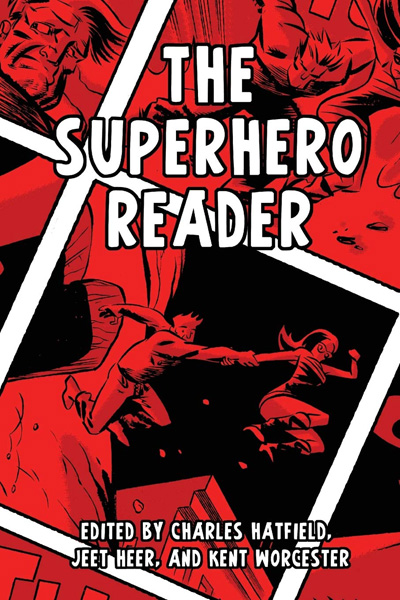Scholars of the Superhero
Every once in a while, we get to talk about serious, scholarly nonfiction. What, scholarly works about comic books? Yeah, they’re out there, so let’s talk about a book that collects a lot of academic works on comics and superheroes: The Superhero Reader, edited by Charles Hatfield, Jeet Heer, and Kent Worcester.
So a reader is basically a collection of short articles, often written from an academic or scholarly viewpoint, that detail a broad selection of information, history, theories, and research on a specific topic. The audience for these are generally professors, students, or dedicated fans of the topic — they’re rarely of much interest to the general public. I’ve got a small selection of other readers — one on horror movies, another on horror movies about ghosts, one on Halloween, and one on lycanthropy.
So this one is, obviously, a reader about superheroes. And you’ll note it isn’t a reader about comics. Comic book history is obviously a big chunk of anything having to do with superheroes, but this is a book about guys and gals in capes and spandex — not underground comix.
Anyway, the book is divided into three major sections, with eight essays in each. The first is “Historical Considerations,” followed by “Theory and Genre” and “Culture and Identity.”
The historical section is probably the most straightforward, as it focuses on the history of the superhero. Some of these essays detail the proto-superheroes who came before Superman’s debut in 1938, the early lives of Jerry Siegel and Joe Shuster, the creation of Wonder Woman, and the first comics fanzines. But what really makes this section interesting is the inclusion of historical documents, including an excerpt from Philip Wylie’s novel “Gladiator,” which influenced the creation of the Man of Steel, and a chapter from Dr. Fredric Wertham’s discredited “Seduction of the Innocent,” which nearly killed off the comic book entirely in the 1950s.
The “Theory and Genre” section seems like the most complex, with dueling essays from the 1970s to the present hashing out the borders of the superhero genre and the relevant tropes from the Golden Age to the Dark Age and beyond, as well as thick discussions of Jack Kirby’s contributions to the Marvel style of storytelling, the concepts of the multiverse as addressed by different comics creators, and the iconic use of cities as superhero settings.
And finally, the “Culture and Identity” section addresses the impact superheroes have had on Western culture and how they’ve been adopted and adapted by marginalized groups. We get essays about Batman and camp, the Invisible Girl as Marvel’s first important superheroine, superheroes of color at Marvel, DC, and Milestone, and even an essay by Gloria Steinem on Wonder Woman’s influence on feminism.
Verdict: Thumbs up. This definitely isn’t going to be for every reader. It’s a thick book full of academic-level discussions of complex topics. If you’re not up for serious scholarship on comics history, sociology, theory, and more, you might want to give this a pass.
But honestly, for most of us who are serious fans of comics and superheroes, this is fun (though sometimes difficult) reading. It’s a great place to get some historical documents that are hard to come by nowadays. It’s a great way to immerse yourself in serious comics theory in a way you just can’t get arguing with fans at the comics shop. And it’s a great way to expose yourself to new viewpoints that can challenge the way you view superheroes.
The essays are sometimes a mixed bag — some researchers argue for views that are now considered dated, particularly in the “Theory and Genre” section. Scholars in the ’70s generally felt that superhero stories were no different from Westerns, science fiction, or cop dramas — simple tales for children, never real literature. And of course, Fredric Wertham’s essay is full of rhetorical acrobatics designed to tar all comics as poisonous to children. But it is important to see the full scope of comics history and theory, to see where we came from and where scholarship needs to evolve further.
Again, if you can handle a lot of challenging reading (and a bit of a high sticker price), this is going to be a rewarding book for any fan of comics and superheroes. Go pick it up!
Comments off

